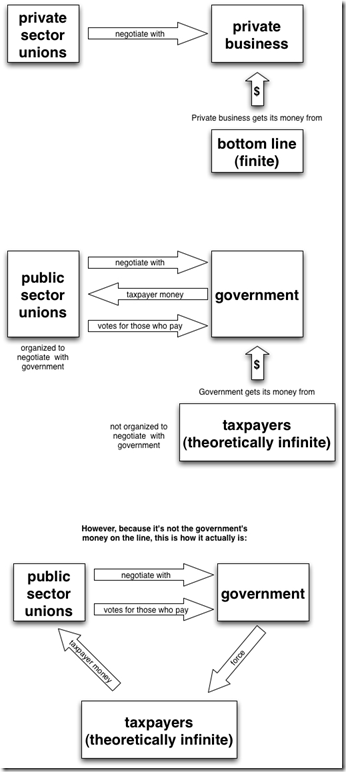Quotes:
Government is nothing more than the combined force of society, or the united power of the multitude, for the peace, order, safety, good and happiness of the people.... There is no king or queen bee distinguished from all others, by size or figure or beauty and variety of colors, in the human hive. No man has yet produced any revelation from heaven in his favor, any divine communication to govern his fellow men. Nature throws us all into the world equal and alike....
The preservation of liberty depends upon the intellectual and moral character of the people. As long as knowledge and virtue are diffused generally among the body of a nation, it is impossible they should be enslaved....
There is danger from all men. The only maxim of a free government ought to be to trust no man living with power to endanger the public liberty.
….the legislative, executive and judicial power shall be placed in separate departments, to the end that it might be a government of laws, and not of men.
Wisdom and knowledge, as well as virtue, diffused generally among the body of the people being necessary for the preservation of their rights and liberties; and as these depend on spreading the opportunities and advantages of education in various parts of the country, and among the different orders of the people, it shall be the duty of legislators and magistrates in all future periods of this commonwealth to cherish the interests of literature and the sciences, and all seminaries of them, especially the university at Cambridge, public schools, and grammar schools in the towns; to encourage private societies and public institutions, rewards and immunities, for the promotion of agriculture, arts, sciences, commerce, trades, manufactures, and a natural history of the country; to countenance and inculcate the principles of humanity and general benevolence, public and private charity, industry and frugality, honesty and punctuality in their dealings, sincerity, good humor, and all social affections, and generous sentiments among the people.
I must judge for myself, but how can I judge, how can any man judge, unless his mind has been opened and enlarged by reading.1
If the people are as wise and honest in the choice of their rulers, as they have been in framing a government, they will be happy, and I shall die content with the prospect for my children.
[Advice to his son:] A young man should weigh well his plans. Integrity should be preserved in all events, as essential to his happiness, through every stage of his existence. His first maxim then should be to place his honor out of reach of all men. In order to do this he must make it a rule never to become dependent on public employments for subsistence.
[Talking about the French Revolution:] I know not what to make of a republic of thirty million atheists.2
Adams told another correspondent. In revolutions, he warned, “the most fiery spirits and flighty geniuses frequently obtained more influence than men of sense and judgment; and the weakest man may carry foolish measures in opposition to wise ones proposed by the ablest.”
My fundamental maxim of government is never to trust the lamb to the wolf.
Reason holds the helm [of the human mind], but passions are the gales.
The rights of one generation of men must depend, in some degree, on the paper transactions of another. The social compact and the laws must be reduced to writing. Obedience to them becomes a national habit and they cannot be changed by revolutions that are costly things. Men will be too economical of their blood and property to have recourse to them very frequently.
If [the] empire of superstition and hypocrisy should be overthrown, happy indeed will it be for the world; but if all religion and all morality should be over-thrown with it, what advantage will be gained? The doctrine of human equality is founded entirely in the Christian doctrine that we are all children of the same Father, all accountable to Him for our conduct to one another, all equally bound to respect each other's self love.
The executive, the governor, should, Adams thought, be chosen by the two houses of the legislature
3, and for not more than a year at a time.
Adams was utterly opposed to slavery and the slave trade and….favored a gradual emancipation of all slaves.
Adams would call slavery a “foul contagion in the human character.” He never owned a slave as a matter of principle, nor hired the slaves of others to work on his farm, as was sometimes done in New England.
Thirteen separate states would have thirteen equal votes, a concept Adams strongly opposed. He advocated voting in proportion to population.
It was the establishment of an independent judiciary, with judges of the Supreme Court appointed, not elected, and for life (“as long as they behave themselves well”), that Adams made one of his greatest contributions not only to Massachusetts but to the country, as time would tell.
He did not believe all men were created equal, except in the eyes of God, but that all men, for all their many obvious differences, were born to equal rights.
Adams had strong views on the matter of recompense for officeholders. He was adamantly opposed to the notion espoused by some that in the ideal republican government public officials should serve without pay. Adams had written earlier while in London, then the consequence would be that “all offices would be monopolized by the rich; the poor and the middling ranks would be excluded and an aristocratic despotism would immediately follow.” He thought public officials should not only be paid, but that their salaries should be commensurate with their responsibilities and necessary expenses.
Greatest was his worry that the country would expect too much of him [as vice president].
If Adams was concerned about making ends meet, Washington had had to arrange a loan to cover personal debts and the expense of moving to New York.
Rank and distinction were essential to any social organization, be it a family, a parish, or a ship, Adams would say. He cared intensely about the future of the republic and, as he had tried to explain in his Defense of the Constitutions, he saw men of education, ability, and wealth as “the natural aristocracy,” the great strength and blessing of society, but potentially also a great threat to liberty, if their power and energies were misdirected.
“The French Revolution,” he wrote to a Dutch friend, Francis van der Kemp, “will, I hope, produce effects in favor of liberty, equity, and humanity as extensive as this whole globe and as lasting as all time.” Yet, he could not help foresee a tragic outcome, in that a single legislative assembly, as chosen by the French, could only mean “great and lasting calamities.”
France was “in great danger.” Ahead of anyone in the government, and more clearly than any, Adams foresaw the French Revolution leading to chaos, horror, and ultimate tyranny.
Source:
John Adams (2001) by David McCullough.
1A kindred spirit.
2 Like the old Soviet Union for example.
3This is the parliamentary system Great Britain and other countries have today.














